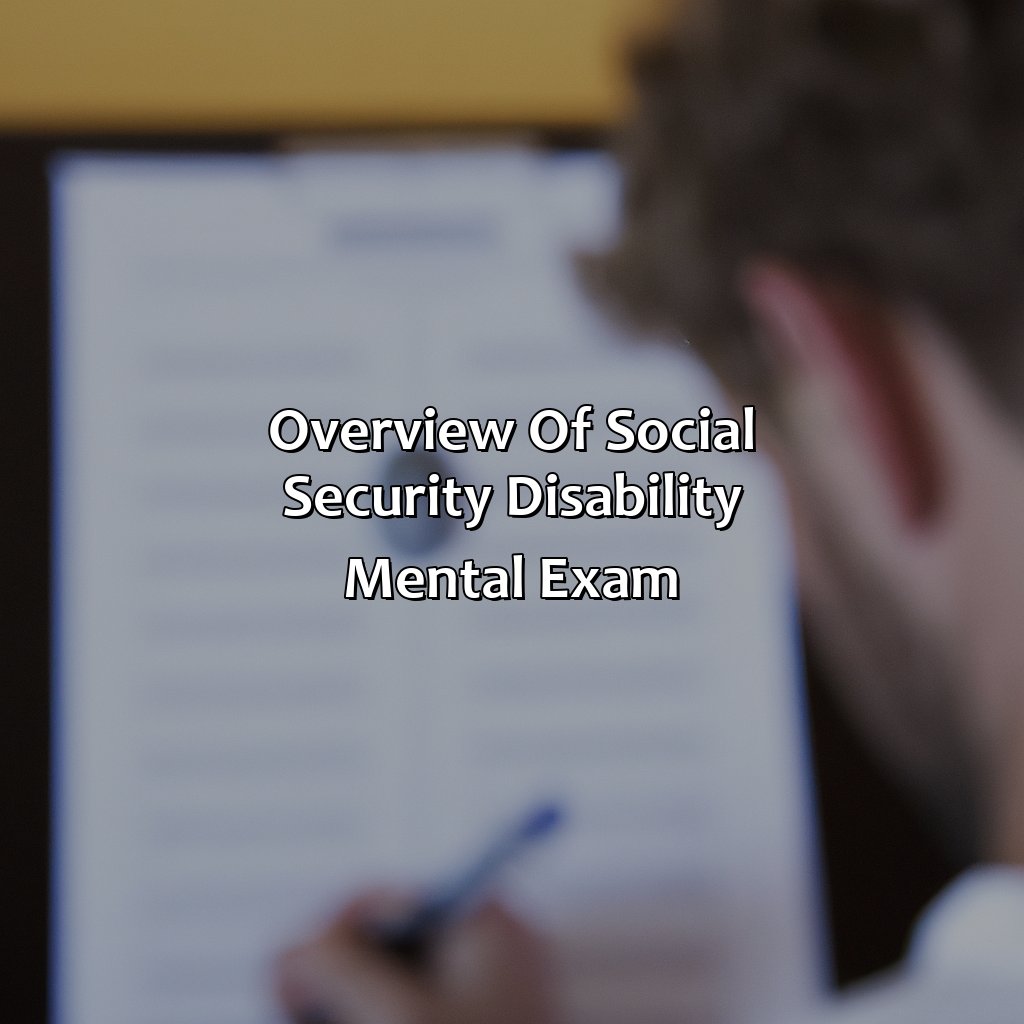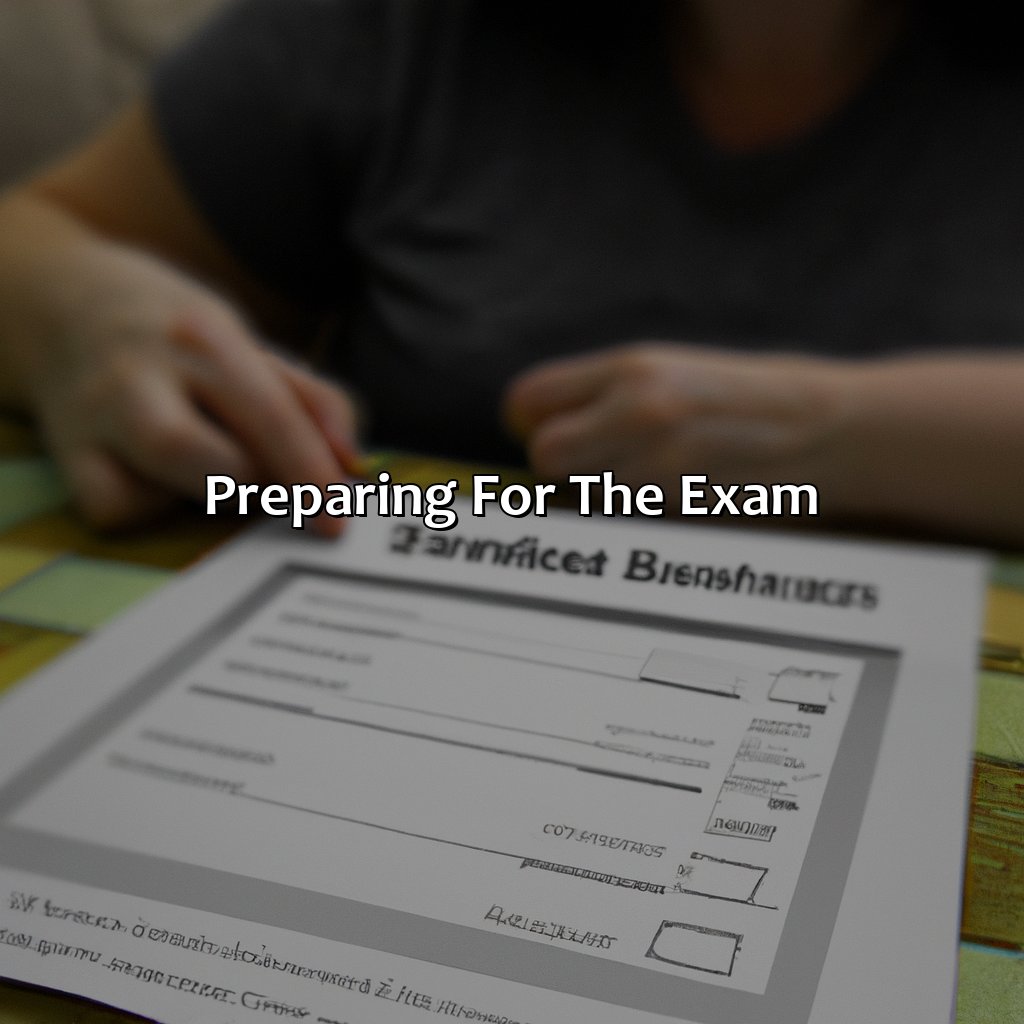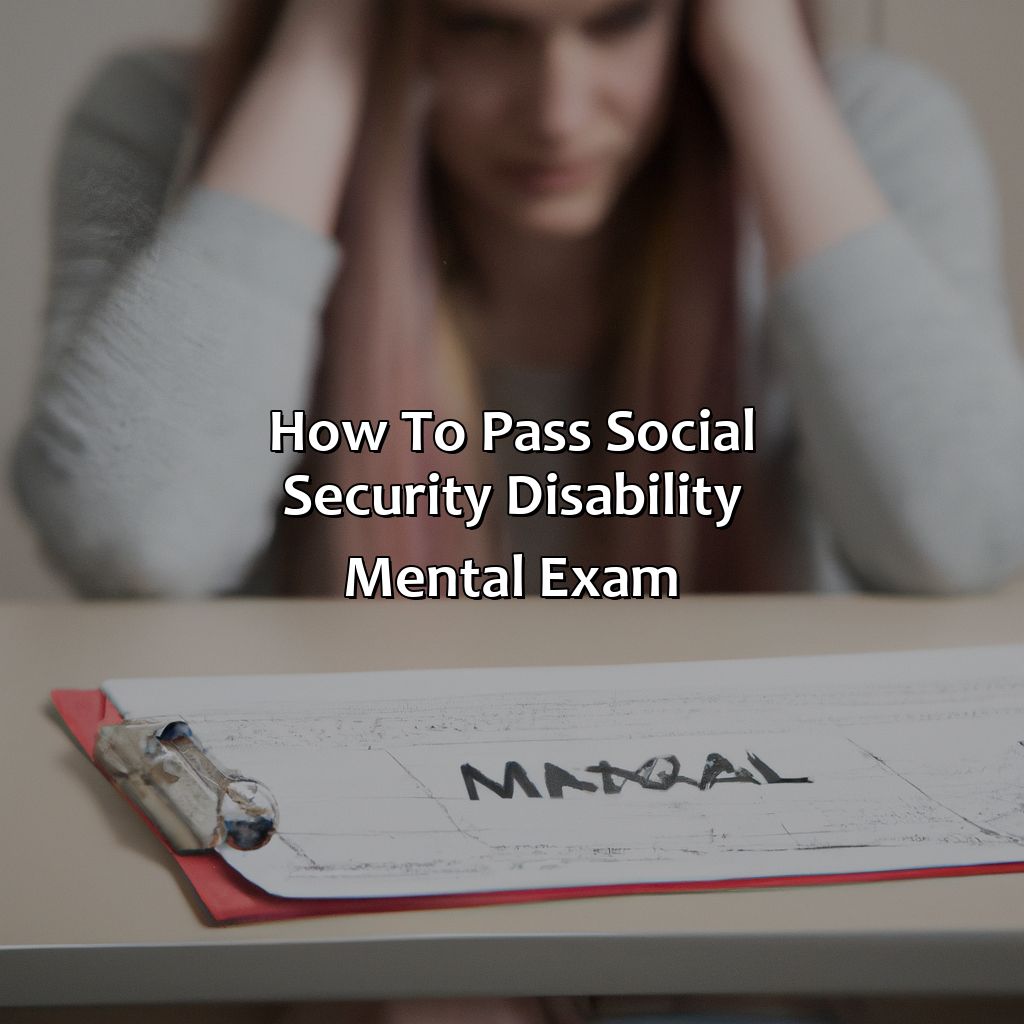How To Pass Social Security Disability Mental Exam?
Key Takeaway:
- Preparing for the Social Security Disability Mental Exam is crucial. You should understand the exam process, gather all medical and mental health records, and consult with a disability attorney. This will give you a better chance of having your claim approved.
- During the exam, it’s important to be honest and cooperative. You should describe your symptoms and limitations in detail and explain how your condition affects your daily life. This will help the examiner understand the severity of your condition.
- After the exam, follow up on any requested tests or documents and check the status of your disability claim. If your claim is denied, consider hiring an attorney to help you with the appeals process.
Do you worry about how the Social Security Disability mental exam could affect your claim? You need to understand the exam process in order to pass it with ease. This blog will guide you through the details, allowing you to prepare and gain the best possible outcome.
Overview of Social Security Disability Mental Exam
The Social Security Disability Mental Exam evaluates a person’s mental abilities and limitations to determine their eligibility for disability benefits. It assesses cognitive, emotional, and behavioral functions and is usually performed by a licensed psychiatrist or psychologist. It also evaluates how the person’s condition affects their daily living, social functioning, and ability to work.
To pass the exam, it is crucial to be honest and consistent with your answers and provide detailed information about your symptoms and limitations. It is also essential to bring any relevant medical records and reports from mental health professionals to support your claim.
Additionally, preparing in advance for the exam by taking notes and practicing specific tasks that may be evaluated can help you feel more confident and prepared. Remember, the exam is not a personality test, and the goal is to evaluate the severity of your condition and its impact on your ability to work. Failure to be honest or provide complete information may result in denial of benefits.
If you have any concerns or questions about the exam, it is essential to speak with an experienced disability attorney who can guide you through the process and help you maximize your chances of approval. Don’t let the fear of the exam prevent you from pursuing the benefits you are entitled to receive.

Image credits: retiregenz.com by Joel Woodhock
Preparing for the Exam
Want to ace your Social Security Disability Mental Exam? Gather your medical and mental health records, talk to a disability attorney, then make use of these tips. This’ll up your chances of getting the disability benefits you deserve!

Image credits: retiregenz.com by David Jones
Understand the Exam Process
It is crucial to comprehend the mental exam process for passing the social security disability test. The exam evaluates an individual’s physical and mental health, daily activities, and other factors that impede their ability to work full-time.
To understand the exam process, prepare appropriate medical records, including psychiatric evaluation reports. A mental status examination assesses the patient’s cognitive function like memory, attention span, and language skills. Reports from vocational experts are also useful for better preparations.
Moreover, a comprehensive statement from family members or friends outlining how your condition influences your daily routine could also be beneficial. These should detail functional impairments related to self-care tasks or daily chores.
Pro Tip: Before attending the interview panel, research commonly used tests that psychiatrists use in order not to get caught off guard in a situation where they ask you these questions.
Make sure to gather all your medical and mental health records– because you don’t want your examiner thinking you’re crazier than you actually are.
Gather All Medical and Mental Health Records
To ensure a successful Social Security Disability Mental Exam, it is imperative to compile and present all Medical and Mental Health Records in an organized manner. This step helps the examiner gain an insight into the applicant’s health history and understand their current condition better. By presenting this information logically, you can paint a clear picture of your disability.
Ensure that all necessary medical records are included, including those from hospitals, clinics, psychiatrists, therapists, and rehabilitation facilities. If you have visited multiple locations for treatment or mental health counseling over the years, it may be helpful to create a folder with all relevant documents. Reviewing past medical records can also help identify dates for symptom-onset and contribute towards building your case.
In addition to gathering all medical facts, consider submitting any other documentation that supports your claim to disability payments from the Social Security Administration. These may include letters of recommendation from friends or family members who have observed changes in your behavior or abilities following the onset of symptoms.
It has been noted by the National Alliance on Mental Illness that 70-90% of people see improvement through treatment and support services– so if necessary make sure to consult qualified individuals in order to address adequately your current situation.
Consulting with a disability attorney is like bringing a cheat sheet to a test, except it’s totally legal.
Consult with a Disability Attorney
When navigating the process of preparing for a social security disability mental exam, consulting with legal representation can be an invaluable resource. Professional advisors can provide insights into best practices and standardized techniques to maximize the outcome of the exam. Additionally, these attorneys often are familiar with how judges evaluate mental health claims, which can help to ensure that your case is evaluated in the most effective manner possible.
Furthermore, a disability attorney can help you prepare evidence packets to provide a clear picture of your overall medical history and current state of health. This information will not only protect your interests but also guide evaluators towards a more accurate diagnosis and determination for disability benefits.
A little-known benefit of consulting with a disability attorney is that they can help assess which doctors would be beneficial to have involved with your case. The right doctor’s input could improve both the chances of receiving benefits as well as the strength of that final decision.
Pro tip: Consider scheduling a consultation with an experienced social security disability attorney early on in your preparation process. Waiting too long could limit what actions may be available to improve evalutions later on.
Don’t worry, the examiner is just there to test your mental faculties, not judge your life choices… unless you tried to bribe them with cookies.
During the Exam
Passing the social security disability mental exam? Honesty and cooperation are essential.
Describe your symptoms and any limitations in great detail. Explain how your condition impacts your day-to-day life. These sub-sections will help you ace the exam!

Image credits: retiregenz.com by Harry Arnold
Be Honest and Cooperative
In order to successfully pass the mental exam for social security disability, it is essential to be forthcoming and amenable. Truthful reporting of symptoms, experiences and functioning can help determine accurate diagnosis and treatment plans. Making sure to cooperate with the examiner’s requests for information will ensure all necessary documentation is secured. It is vital to provide a clear picture of one’s struggles for optimal consideration of benefits.
Along with honesty and cooperation, remaining attentive and composed throughout the examination can improve results. Being open about any concerns or uncertainties surrounding the process may alleviate apprehension or anxiousness. A positive attitude towards seeking assistance through disability benefits can also offer useful insight into perception during the evaluation.
While being honest and cooperative is critical, becoming overwhelmed by stress or fear during the assessment could impede progress. To control these feelings, it might prove beneficial to focus on relaxation techniques such as deep breathing exercises or visualizing calming imagery when feeling overwhelmed.
A recent study revealed that individuals who were forthcoming regarding their experiences were more likely to receive fair compensation for disabilities incurred due to psychological illnesses. Therefore, being genuine regarding existing struggles efficiently proves crucial when dealing with social security evaluations based on mental health disorders.
Time to play a game of ‘How much can I complain without sounding like a hypochondriac’ in this section.
Describe Your Symptoms and Limitations in Detail
To ensure success in the social security disability mental exam, it is essential to describe your symptoms and limitations with precision. Elaborate on the details of your condition and its impact on everyday tasks. Use relevant examples and avoid overgeneralizing. This will enhance your chances of getting a fair evaluation.
In addition to discussing general symptoms, provide specific instances where you faced challenges. Be descriptive about your experiences, including how they occurred, how often they occur and how long they last. By giving these specifics, it helps the examiner better understand your situation and improve your chances of being awarded benefits.
An important aspect of describing your symptoms and limitations is to add unique details that have not been covered earlier in the conversation. It may help identify elements that were previously unknown about an individual’s condition. With this information, the examiner can form a more complete understanding of an individual’s restrictions.
A common mistake during Social Security Disability Mental Exam is leaving out critical details or providing inaccurate data, which can harm your chances of getting benefits. Therefore, it is crucial to be precise when explaining your symptoms and provide accurate information when answering questions related to previous medical or psychiatric treatments. Not providing complete information may affect your benefits negatively.
“Explaining my daily struggles is like trying to explain calculus to a toddler, no matter how hard I try, they just don’t get it.”
Explain How Your Condition Affects Your Daily Life
Your ability to perform everyday activities can be significantly impacted by your condition, and it is critical to provide an accurate depiction of how this affects your life during a social security disability mental exam. This may include difficulties with maintaining relationships, managing daily responsibilities, or engaging in hobbies. Communicate any challenges you face in completing tasks and how they have affected your daily routine.
Additionally, proper documentation can aid in conveying the extent of your limitations caused by your condition. Examples may include medical records, therapy notes, or witness statements from family members or friends who have observed your struggles. Providing thorough and detailed information can increase the likelihood of a successful outcome for your case.
It’s essential to remain truthful and genuine when providing examples during the exam. Avoid exaggerating the impact on your life but accurately portray what you go through regularly. For instance, detail any physical or emotional pain you experience daily that impairs your ability to function as usual. Remember to communicate specifics instead of generalities that may undermine your case.
One patient who had chronic depression shared their difficulties with going about their day without feeling overwhelmed with feelings of emptiness and guilt at not being productive enough at work which triggered bursts of anxiety.
Overall undergoing a social security disability mental exam takes skillful preparation and honest communication with assessors regarding how one’s condition affects them could make all the difference in winning eligibility for financial assistance to ease an individual’s sufferings emotionally, physically and financially.
After that grueling exam, the only disability I have is a mental one from trying to remember all my personal information.
After the Exam
Don’t miss out on any key steps after your Social Security Disability Mental Exam! Make sure to:
- Follow up on any tests or documents requested.
- Check the status of your disability claim.
- Hire an attorney if your claim is denied.

Image credits: retiregenz.com by Harry Washington
Follow up on any Requested Tests or Documents
Ensure completion of any medical tests or submission of relevant documents as requested by the Social Security Administration (SSA) after the mental exam. This could include medical records, physician statements, and psychological evaluations. Failure to provide any necessary information may result in denial of benefits.
Additionally, follow up with your healthcare providers to ensure timely completion and submission of any outstanding requests from the SSA. This will help expedite the claims process and increase chances of approval.
Remember that providing complete and accurate documentation is crucial for receiving disability benefits. Consult with an experienced attorney if needed to ensure all requirements are met and deadlines are followed with care.
Don’t miss out on getting your rightful benefits due to incomplete paperwork or missed deadlines. Take action promptly to secure your financial future.
Checking the status of your disability claim is like constantly refreshing a webpage and hoping for a different result.
Check the Status of Your Disability Claim
Have insight into the progress of your disability claim with ease. Here’s how to Monitor the Position of Your Social Security Disability Claim effectively.
Unsure of your claim’s status? Use our straightforward guide to check and maintain control over your SSDI application.
- Access the Social Security Administration (SSA) official website.
- Login or sign up for an account that enables you to evaluate your benefits status online.
- Check your account on a regular basis for updates regarding decision, delays or additions required to complete the review process.
- Contact the SSA customer service number should further inquiry be needed about your updated status.
It is imperative to regularly check your SSDI application progress, so you are aware of any changes made to it and can respond accordingly.
Individuals who neglected their problems may experience unwarranted concerns later in the process. Take action now and monitor your social security disability claim efficaciously.
In case you don’t understand what each update implies, call or use other available support channels for clarity.
The stakes are high; knowing where your case stands increases the possibility that benefits will come sooner than later.
Mary tried several times post-taking her mental disability exam before receiving a long-awaited acknowledgement of approval from SSA after she initiated following her application through an enhanced monitoring system.
Consider Hiring an Attorney if Your Claim is Denied.
If your social security disability mental exam is denied, seeking legal representation may be crucial. An attorney who specializes in disability law can navigate the complex process of appealing a denial and help gather necessary evidence to support your claim. They can also provide guidance on how to handle possible discrepancies or inconsistencies with medical records.
In addition to representation, an attorney can also provide peace of mind during an already stressful time. They are equipped with knowledge of the system and can use their experience to increase your chances of success. It is important to find a trustworthy lawyer who has a proven track record in handling similar cases.
Remember, if your claim is denied, do not hesitate to seek legal help. An attorney can assist through every step of the appeals process and improve your chances of receiving benefits. Act now before it’s too late.
Five Facts About How To Pass Social Security Disability Mental Exam:
The Social Security Disability mental exam is designed to evaluate an individual’s ability to work and perform daily activities due to mental health conditions. (Source: Disability Advisor)
The exam may include tests to assess memory, cognitive function, and emotional stability. (Source: NOLO)
It is important to be honest and open during the exam, as exaggerating or downplaying symptoms can be detrimental to the disability claim. (Source: AllLaw)
Preparing for the exam by reviewing medical records and discussing concerns with a healthcare provider can improve the chances of a successful disability claim. (Source: The Balance)
Working with an experienced disability lawyer can help navigate the complexities of the application and appeals process for Social Security Disability benefits. (Source: Disability Secrets)
FAQs about How To Pass Social Security Disability Mental Exam?
What is a Social Security Disability Mental Exam?
A Social Security Disability Mental Exam is a medical exam conducted by a licensed and qualified doctor to evaluate a person’s mental capabilities and limitations in order to determine their eligibility for disability benefits.
How can I prepare for a Social Security Disability Mental Exam?
To prepare for a Social Security Disability Mental Exam, make sure to get a good night’s sleep and eat a healthy meal on the day of the exam. Also, bring all relevant medical records and be prepared to answer questions about your medical history and current symptoms.
What should I expect during a Social Security Disability Mental Exam?
During a Social Security Disability Mental Exam, the doctor will ask you a series of questions about your mental health and will also conduct a series of tests to evaluate your mental capabilities and limitations. It is important to be honest and open with the doctor during the exam.
How long does a Social Security Disability Mental Exam take?
The length of a Social Security Disability Mental Exam can vary depending on the doctor, but it typically takes between one and two hours to complete.
What happens after a Social Security Disability Mental Exam?
After a Social Security Disability Mental Exam, the doctor will send their evaluation to the Social Security Administration. The SSA will then use this evaluation to determine if the person is eligible for disability benefits.
Can I appeal the results of a Social Security Disability Mental Exam if I am denied benefits?
Yes, if a person is denied disability benefits based on the results of a Social Security Disability Mental Exam, they have the right to appeal the decision. This may involve providing additional evidence or undergoing another exam with a different doctor.
 Checkout this IRS Loophole
Checkout this IRS Loophole 
